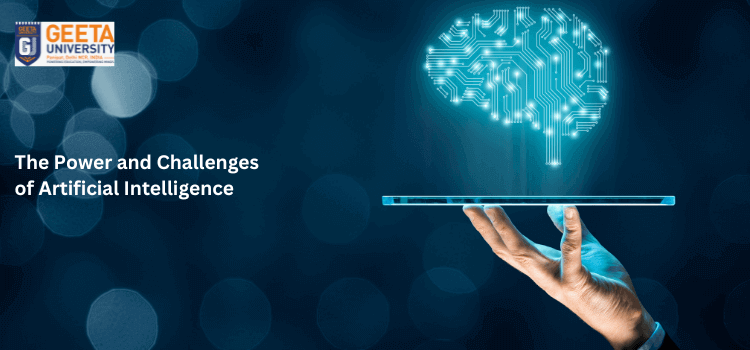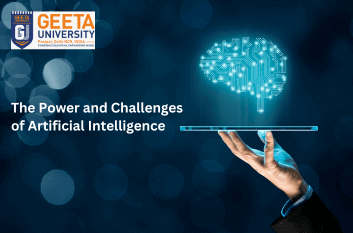The Power and Challenges of Artificial Intelligence – Geeta University
Uncategorized Best Career Options in geeta university, best college, best diploma university in haryana, Best engineering College in Haryana, best Law college in Haryana, best mba college in haryana, Best University in Haryana, Geeta University, Uncategorized
The Power and Challenges of Artificial Intelligence – Geeta University
Artificial intelligence (AI) is a rapidly growing field that is transforming the way we live and work. AI refers to the development of computer programs that can perform tasks that would normally require human intelligence. These tasks include visual perception, speech recognition, decision-making, and language translation. In this blog, we will explore the basics of AI, its applications, benefits, and challenges.
Introduction to Artificial Intelligence :
Artificial intelligence is a branch of computer science that focuses on the development of intelligent machines. It involves the creation of algorithms that can learn and improve from experience. The goal of AI is to create machines that can perform tasks that normally require human intelligence, such as recognizing speech, identifying objects in images, and making decisions.
Applications of Artificial Intelligence :
AI has many practical applications across various industries, including:
Healthcare: AI can be used in healthcare to assist with medical diagnosis, drug development, and personalized treatment plans.
Finance: AI can be used in finance to assist with fraud detection, risk management, and customer service.
Manufacturing: AI can be used in manufacturing to assist with quality control, predictive maintenance, and inventory management.
Transportation: AI can be used in transportation to assist with traffic management, route optimization, and vehicle automation.
Benefits of Artificial Intelligence :
The benefits of AI are many and varied, including:
Improved Efficiency: AI can perform tasks faster and more accurately than humans, leading to improved efficiency in various industries.
Enhanced Accuracy: AI can make decisions based on data analysis, which can lead to more accurate predictions and outcomes.
Increased Safety: AI can be used to perform dangerous tasks that would normally put human lives at risk, such as inspecting pipelines, mines, and offshore platforms.
Personalization: AI can be used to personalize products and services to meet individual customer needs.
Challenges of Artificial Intelligence :
While AI has many benefits, it also poses significant challenges, including:
Job Displacement: AI has the potential to automate many jobs, leading to job displacement for many workers.
Ethical Concerns: AI raises ethical concerns around issues such as privacy, bias, and accountability.
Cybersecurity: AI poses cybersecurity risks, as hackers can use AI to create more sophisticated attacks.
Lack of Transparency: AI can be difficult to understand and interpret, which can lead to a lack of transparency in decision-making.
Future of Artificial Intelligence :
The future of AI is promising, with many potential developments on the horizon. Some of the areas where AI is expected to make significant advances include:
Robotics: AI-powered robots are expected to become more advanced and capable, leading to increased use in various industries.
Healthcare: AI is expected to play a major role in healthcare, assisting with diagnosis, treatment, and drug development.
Conclusion:
Artificial intelligence is a rapidly evolving field that has the potential to transform many aspects of our lives. AI has many practical applications in various industries, and its benefits include improved efficiency, enhanced accuracy, increased safety, and personalization. However, AI also poses significant challenges, including job displacement, ethical concerns, cybersecurity risks, and a lack of transparency. Despite these challenges, the future of AI is promising, with many potential developments on the horizon. As AI continues to advance, it is important for researchers, policymakers, and the public to work together to address the challenges and realize the benefits of this technology.
If you like it, then keep reading the top university in Delhi, NCR viz. Geeta University’s blogs!!!
- By Garvita Aggarwal
Related Posts
Understanding Obesity : Causes and Consequences
Introduction: Obesity is a medical condition characterized by an excessive accumulation of body fat, which can have detrimental effects on health. It’s typically measured by body mass index (BMI), which is calculated by dividing a person’s weight in kilograms by
Guesstimates: The Art and Science of Estimation
Introduction: In a world inundated with uncertainty, guesstimates emerge as a tool to navigate the murky waters of ambiguity. Derived from a blend of “guess” and “estimate,” guesstimates represent a methodology for approximating values, quantities, or outcomes in the absence
Humanoid Robots and Social Interaction with AI
Introduction to Humanoid Robots Humanoid robots are robotic systems designed to resemble the human body, both in form and function. These robots typically feature a head, torso, two arms, and two legs, mimicking the human physical structure. However, it is



